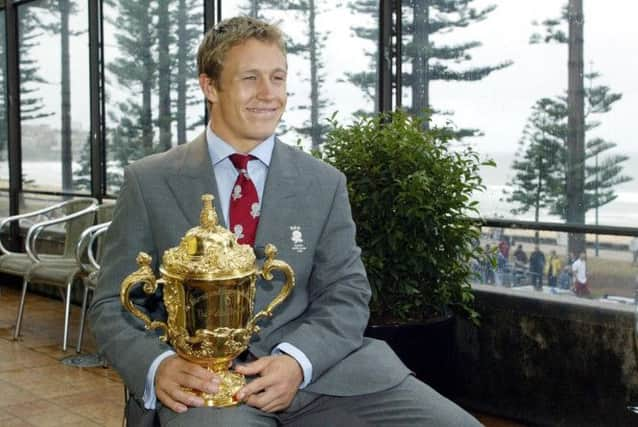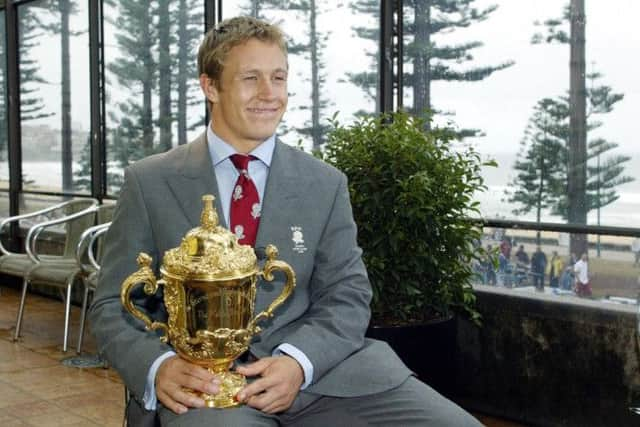Rugby World Cup hero Jonny Wilkinson to retire


Eleven years later, even the ultimate perfectionist may realise how wrong he had been.
That moment, during a nerve-shredding finale in Sydney, when he swung his right foot to crown England as the first northern hemisphere world champions, will undoubtedly top Wilkinson’s list of achievements.
Advertisement
Hide AdAdvertisement
Hide AdWhen he went three-and-half injury-ravaged years before appearing again for his country, that ‘only way is down’ outlook must have seemed gloomily prescient.


There was, however, still much, much more to come as Wilkinson embarked on his long and winding road of sporting success and personal development – and entwined with enough serious injuries to have finished three careers.
He can point to six British and Irish Lions caps, 91 appearances for England, who he helped to a second World Cup final appearance in 2007 and to four Six Nations titles.
There was also an emotional Heineken Cup triumph for Toulon last year, a feat which supported his coronation as European Player of the Year.
In Cardiff on Saturday, a day shy of his 35th birthday, he will try to help Toulon retain that title against Saracens before playing his final match in the French Top 14 final against Castres the following week. After that, he will retire.
Until then, however, his motivation will be exactly as it was when he began playing mini-rugby as a seven-year old – to give absolutely everything, physically and mentally, to help the team succeed. Nothing less.
There can, surely, be very few sportsmen who reached such a pinnacle of achievement by claiming so little personal glory – and who dedicated so much of his life to mining every last drop of his own talent before
enhancing it with endless, obsessional practice. Throughout his career, Wilkinson simply refused to be beaten – by opponents, situations or six painful months of rehabilitation. His 2011 autobiography Jonny included an illuminating passage about his first years of contact rugby. In it, he explained in matter-of-fact style, the joy he felt when he saw the parents of a victim of one of his destructive tackles burst into tears. There was no malice – just satisfaction at a task completed to the best of his ability and for the good of his team.
Advertisement
Hide AdAdvertisement
Hide AdWilkinson continued to smash into opponents throughout his career and became the toughest-tackling fly-half the game has known. His fearless and total dedication did not always serve him well. Some of his many injuries may have been avoided if he had followed the more traditional and cautious approach of the key playmaker.
Wilkinson, of course, refused to countenance such nonsense and he will hurtle into every collision over the next two weekends with all the familiar gusto he can muster.
While he will certainly join the pantheon of England greats, his early international experiences gave little hint of what was to come.
In 1998, he helped Newcastle to an unlikely league title and won his first cap, off the bench against Ireland, as an 18-year-old winger. He played in the ‘tour of hell’ that featured humiliating thrashings by Australia (76-0) and New Zealand (64-22) and saw Paul Grayson preferred at flyhalf for the 1999 World Cup quarter-final defeat by South Africa.
By the time the next World Cup came around, he was a British and Irish Lion, albeit a losing one in Australia, and had established himself as England’s metronomic points machine, whose dedication to practice was already legendary.
By its end, he had written his page in British sporting folklore, his drop-goal in the last minute of extra time securing that famous 20-17 victory over the much-fancied Australia. He was named Britain’s Sports Personality of the Year, IRB Player of the Year, made an MBE and then an OBE – all of which, typically, he felt immensely uncomfortable about.
Then the injuries came thick and fast: shoulder, bicep, knee, ankle, hernia and lacerated kidney. No sooner had he recovered from one than it seemed he would be struck down again.
Wilkinson never complained and never rued his luck. He reacted simply by trying his utmost to recover.He did it so well, and so often, that successive England and Lions coaches found they could not do without his assured and proven match-winning presence. He went on and established himself as the sport’s all-time leading test points scorer – since overtaken by All Black Dan Carter.
Advertisement
Hide AdAdvertisement
Hide AdHis 91st, and final, England game was the quarter-final defeat by France at the 2011 World Cup, where he was suffering to the last. “Right to the end of that game, I still couldn’t bear the thought of not being perfect, or letting people down,” he wrote in his autobiography. “When you’re obsessive, like me, searching for something unattainable can become unhealthy.”
He found solace, however, in Toulon, after moving in 2009. Wilkinson thrived in the Mediterranean port, immersing himself in the city and the club, winning the respect of both the locals and the collection of world-class talents that their money-laden outfit has been able to attract.
He took huge pleasure in taking home the Heineken Cup last season, not missing a single goal kick in the three knockout games, but, typically, felt the campaign had been a failure when Toulon were beaten, by Castres, in the Top 14 final.
He has that chance to make amends over the next two weeks when a second Heineken final is followed by a rematch with the domestic champions.
Lancaster pays tribute to ‘complete player who changed the game’
JONNY Wilkinson will enter retirement bearing the ultimate tribute from England head coach Stuart Lancaster, who believes the World Cup winner’s influence has changed the face of the game.
Wilkinson’s remarkable 17-year professional career is just two matches away from its conclusion after he announced he will hang up his boots at the end of the season. The 34-year-old, arguably the sport’s biggest star, will bow out with Toulon’s Heineken Cup final against Saracens on Saturday and the Top 14 final against Castres the following weekend.
Lancaster believes Wilkinson’s impact on the sport has been vast, highlighting the extraordinary level of dedication shown by the former England fly-half and captain. “I’ve never had the privilege to coach Jonny but he will get a huge number of plaudits and rightly so,” Lancaster said. “He has changed the way the game has been played, but more importantly changed the way in which people prepare to play the game. Jonny has the full repertoire as a fly-half. He’s got an unbelievable kicking game, his defence is outstanding, he has great distribution off either hand. To do that so consistently for so long sets him apart. The point I’d emphasise more is the way he prepared to play the game.
Advertisement
Hide AdAdvertisement
Hide Ad“The detail and preparation he did off the field made him the complete player. His influence on so many rugby players across the world in that respect is phenomenal.
“I can’t actually think of a player in rugby who would have had the same impact on the sport as him.”
Wilkinson’s imminent retirement had been widely anticipated and the news was confirmed on Toulon’s website yesterday. “I would like to take this opportunity to formally announce my retirement from playing rugby,” said Wilkinson, who is 35 on Sunday. “It goes without saying that I have an enormous number of people to thank for their support from all around the world, but especially here in France and in England.”